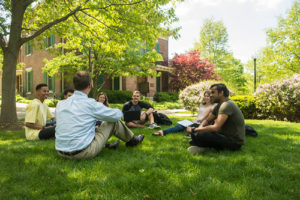Mentoring is one of the pillars of Indiana State University (ISU). The school offers an assortment of both formal and informal options, including programs that serve distinct student populations. Others involve peer mentoring or drawing on an axis of faculty-staff-alumni to lend their guidance and support.
After winning a five-year, $2.38 million dollar grant in September from the U.S. Department of Education’s competitive Strengthening Institution Program, ISU is amping up to enlarge its mentoring opportunities.
Research has shown the transformative effects of mentoring on students, especially for those who come from impoverished backgrounds. “Relationships matter,” says Josh Powers, associate vice president for student success at ISU. “That is at the core of mentoring. It’s particularly important for marginalized students to feel like they matter and someone is investing in them.”
Exact numbers are hard to come by, but Powers estimates that at least one-third of ISU students have taken advantage of a mentoring program at one time or another. For example, Destination Success, in the College of Technology, uses faculty and outside alumni to mentor women in technology; the Mentoring Assistance Program (MAPS), run by the African American Cultural Center, helps minority students complete their education.
Powers says that there are three formal goals of the grant:
- to improve student retention and on-time graduation rates
- to expand opportunities to train, support, and educate mentors whether they be peers, faculty, or staff
- to provide more mentoring to faculty “in the instructional enterprise and their expertise supporting the success of historically disadvantaged students”
The first step is for ISU to assess its needs and opportunities to determine the best way to spend the money. Plans include sending four members from the grant leadership team to other campuses with a recognized expertise to get ideas; improving ISU’s technology support to help match mentors and mentees better; and adding staff, including a director and coordinator. ISU will most likely build some type of centralized space near campus with offices to accommodate mentoring and training.
How to start your own program
For schools that would like to mount effective mentoring programs, Powers suggests the following:
- Expand your definition of mentoring. “Recognize that this is not only about formalized forms of mentoring. Everyday interactions can be thoughtfully conducted in ways that have mentoring benefits. Relationships need care and feeding. People need to learn how to do that well.”
- Take stock of your current mentoring programs. See if what you’re already doing is focused in the right direction and well-coordinated. For example, different units on campus might each believe that freshmen need mentors, but they might not be communicating clearly with each other or with students.
- Streamline your offerings. “Language is really important. Sometimes it can be confusing to students: Who are these people? What are their roles? I’ve got a coach here and mentor there. Are they the same thing?”
- Communicate wisely. “Talk to students who are serving as mentors as well as students who might benefit from mentoring. You can get insight into what they would be looking for from a mentoring program at the college level.”
- Involve as many people as you can. “Fundamentally, this is about inclusive excellence. A GPA can be both empowering and devastating. Mentoring can be a place to help students see there’s so much more [to an education] than just a GPA.”
- A bungled FAFSA rollout threatens students’ college ambitions - April 19, 2024
- Using real-world tools to prepare students for the workforce - April 18, 2024
- 8 top trends in higher education to watch in 2024 - April 16, 2024

